Draper FlexShade XL Kurulum ve Çalıştırma Talimatları - Sayfa 4
İç Mekan Mobilyaları Draper FlexShade XL için çevrimiçi göz atın veya pdf Kurulum ve Çalıştırma Talimatları indirin. Draper FlexShade XL 6 sayfaları. Very large motorized shading system. angled/curved headbox

FlexShade
XL
®
Section 5 - Electrical Connections
Shade operates on 110-120V, 60 Hz. current. Shade is shipped with internal wiring complete and control switch(es) fully boxed, and standardly supplied with a
6' cable lead. Longer lead can be substituted by removing two screws in motor end of roller, removing lead, plugging new lead in, and replacing screws. Wire to
connect shade to switch(es) and switch(es) to power supply should be furnished by installer. Connections should be made in accordance with attached wiring
diagram, and wiring should comply with national and local electrical codes. DO NOT wire motors in parallel without written permission from Draper.
All operating switches should be "off" before power is connected.
Please Note: For low voltage wiring requirements, Draper recommends consulting with a professional low voltage electrical contractor.
It is very important that shielded and stranded CAT 5 cable be used to prevent any electrical interference.
Section 6 - Limit Switch Adjustments
Section 6.1 - Standard and Quiet Motors
Caution: Be sure all switches are in "off" position before adjusting limit switches. Always be prepared to shut off manually when new adjustment is being
tested. Do not allow the shade roller to become exposed by running the shade fabric too far down. Shade may be severely damaged if allowed to
run too far up or down. Each shade's limit switch must be set if using group control system. Motor should be installed so limit switches are pointed
down or accessible.
Section 6.1.1- Push Button Limits
1. Fully depress both limit switch push buttons, then operate wall switch to make sure system works properly.
2. Raise shade to desired "up" stop position.
3. Set upper limit by depressing and releasing the proper (back) push button.
4. Lower shade to desired "down" stop position.
5. Set lower limit by depressing and releasing the proper (front) push button.
Section 6.1.2 - Screw-Type Limits
1. Determine which direction of fabric travel corresponds with arrows on motor.
2. Operate shade to desired "down" stop position.
Set limit by turning the proper socket toward the "+" to lower the limit, and "-" to raise it.
3. Operate shade to desired "up" stopping position.
Set limit by turning the proper screw toward the "-" to raise the limit, and "+" to lower it.
Section 6.2 - Limit Switch Adjustments—RTS Motors
For limit setting instructions on these motors, see Draper's RFRC_Motor_Prog_Inst available in the motorized shades section of www.draperinc.com.
Field Adjustments
Each Draper Solar Control Shade is tested to ensure proper operation. Even with this testing, some field adjustments may be needed for telescoping.
If the shade is telescoping, place a piece of high quality gaffer tape about 1" wide on the exposed roller (where the fabric will cover it) on the side that the
fabric will be drawn toward. For example: if the fabric is tracking to the left, place the tape on the right side.
Cleaning and Maintenance
Window covering products manufactured by Draper, when properly installed, should require no operational maintenance or lubrication.
Most of Draper's standard fabrics may be cleaned at the window by vacuuming with a soft brush attachment. They also may be cleaned by using a sponge
or soft cloth and mild solution of warm soapy water. A mild dishwashing liquid is recommended. A clean dry cloth is recommended for the metal finish.
Please Note: Exceptions are Flocké, Roc-Rol, Obion and Phifer SW7000 fabrics, which must be cleaned with a dry art sponge.
page 4 of 6
Front
(Yellow)
Back
(White)
PUSH BUTTON LIMITS
Bottom View
Front
(Yellow)
Back
Side View
(White)
+
Bottom View
Front
(Yellow)
SCREW-TYPE LIMITS
Back
(White)
Bottom View
+
Screws
Side View
Front
(Yellow)
Back
+
(White)
Side View
Bottom View
Figure 5
Screws
Side View
+
